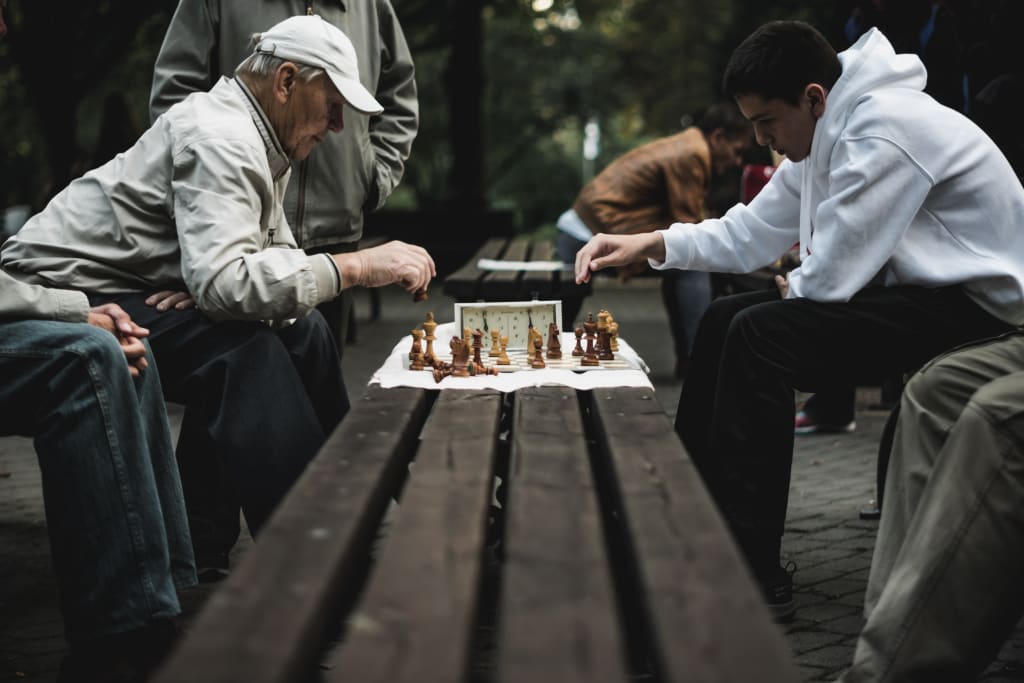It's chess between two players. While one person can read minds, the other has the ability to predict the future.
Chess is a game of two players

Chess is a game of two players, but the game is won by a player who has the ability to read minds. If I can read his mind, then I know that he knows that I know that he knows what move he's going to make. But if he can read my mind, then he knows that I know that he knows that I know what move he's going to make and so on. So ultimately, the player who has this ability will win every time because they can anticipate their opponent's moves before they are made—while all other players must rely on chance or luck in order to win at chess!
If I can read his mind, then I know that he knows that I know that he knows what move he's going to make.
If I can read his mind, then I know that he knows that I know that he knows what move he's going to make. He also knows that if my prediction is wrong, then so will be his next move.
The solution to this problem lies in the fact that each player has different information than the other player: one player has access to all of it while another only sees part of it. The key thing here is how you use this information—you need to be able to predict what your opponent will do based on who they are and where they are in a relationship with each other (i.e., whether or not there exists a certain possibility). This means understanding them at both a superficial level where everybody looks like humans but underneath their skin where things aren't always as easy-going as they appear; doing so requires knowing more about yourself than anyone else could ever teach you!
If I predict the future, then I know that he knows that I know what move he's going to make.
In chess, it's all about reading your opponent. The first player knows how to play chess better than the other, and he can always predict what move his opponent will make next. If you're playing a game of chess against someone who has this ability, then you have no chance of winning!
But if we take away the ability to read minds from one side and give it only to another person (or persons), then maybe we can find a way around this problem: predicting each other's moves would require superhuman powers of observation rather than just some extra knowledge that everyone has already been born with—and maybe someday we'll have those kinds of superpowers too!
Of course, if we're going to get into a discussion of the origins of superhuman powers, then it's probably best to start with the basics: what is human nature? If we take away all our differences in ability and skill, then what remains?
But if he can read my mind, then he knows that I know that he knows that I know what move he's going to make. , and so on.
You see, it's a two-way street. If you can read minds, then so can the other person. And if he can predict the future with his own mind-reading abilities and you don't know what move has been made by him yet—well then...
The game is won by the player who can read minds and predict the future!
If you're a beginner to the game and don't know how to play it, here's a quick tutorial on how to play mind-reading chess:
So ultimately, the player who has the ability to read minds will always win because they can anticipate the other person's moves before they are made.
You might be thinking that reading minds is a skill, and predicting the future is a skill. But it isn't—reading minds is easier than predicting the future.
You can probably tell by now that this article has been written with an angle that benefits me: chess players have better odds of winning than their non-chess-playing opponents because they have superior skills in reading minds, which allows them to anticipate their opponent's moves before they happen. This makes sense when you think about it—if you know what your opponent will do before he does it, then you have more time to prepare yourself for any given situation. The more time available to make decisions during a game (or life), the better off one will be at executing those decisions successfully!
But what if you don't play chess? What if you're not a good reader, either? Well, that's where it gets interesting. The same skills that allow a chess player to read minds will help anyone else be more successful in life—including reading minds! But how does this work?
chess is a game of two players and the game is won by a player who can read minds
In chess, each player has a board with 64 squares on it. Each player also has two pieces: one white and one black. The object of this game is to move your pieces into the opponent's territory so that there are no legal moves for them to make any more (or at least not any faster than yours).
The first thing you need to know about chess is that it's a two-player game—and there's another key point: It's won by a player who can read minds! That means if your opponent knows what you're thinking, then they can anticipate your next move before you even make it. If they do this often enough, then eventually they'll win because their prediction will be correct every time!
There are many different strategies for playing chess, but the easiest way to get started is by learning how to move your pieces. Each piece has its own special characteristics that make it especially useful in certain situations.
If you’re a chess master, then congratulations! You can now play the game of chess against your own mind. It might sound like it would be pretty easy to win this way but remember that if you are reading my mind then there is no winning for me because I can always predict what move you will make before it happens.
About the Creator
Nipun M. Wijerathne
Hello! I’m a creative writer, and I love it. I write creative fiction & mysteries of my own making. When I’m not writing, you’ll find me reading and watching.
Enjoyed the story? Support the Creator.
Subscribe for free to receive all their stories in your feed. You could also pledge your support or give them a one-off tip, letting them know you appreciate their work.






Comments
There are no comments for this story
Be the first to respond and start the conversation.